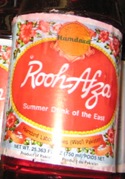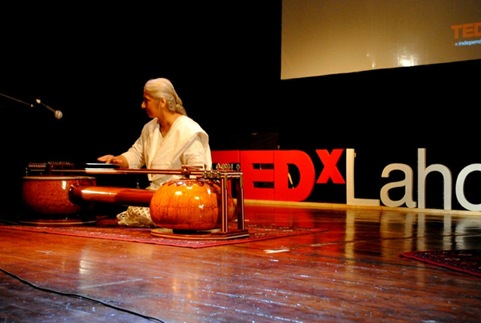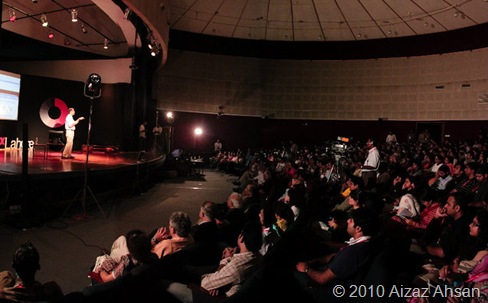10 Things I learnt from TEDxLahore
This post was featured in “The Nation” – “Things I learnt from TEDxLahore”
1. The Importance of a Unified Message (Narrative)
This was a person who was a part of an extremist organization, that despite its “wrong” intentions, gained quite a following. What causes such a following? Why did Nazi Germany flourish under such an evil & tyrannical rule?
To Maajid Nawaz, its a simple equation of having a unified narrative, symbols and a leader. Unfortunately, for Pakistan, these components are different for different groups of Pakistanis. Having this unified message and a narrative could be the solution to a Pakistan that is currently divided. I would be surprised if this talk does not go on the TED website soon.
2. The power of expression through freedom of inquiry
What can be more liberating than making your own instrument to express your feelings? I am not a big fan of classical South Asian music, but I realized how music can be an outlet for an explosion of emotions, in this case those of the TEDxLahore audience. The Sanjan Nagar Institute of Philosophy and Arts teaches much more than music, it teaches one to be aware of oneself, and inquire about life. The philosophy that is encouraged in this institution is unprecedented in Pakistan. The audience rightfully gave Noor Zehra, the only person who can play the Saagar Veena, a standing ovation.
3. Your capacity for charity needs to increase gradually
Mudassir Zia gave a speech that touched many who have their entire lives ahead of them. When you graduate, you have the entire corporate world in front of you, and charity seems like something that is holding you back. Yet, if you could start with the smallest act of charity, and move up with small increments, you might as well dedicate your life to charitable acts like Mudassir Zia did. He used the example of carrying a calf in the village, and how if one carries that in the beginning, carrying a big cow on your shoulders will not seem like much of a burden.
4. Access to information can change lives
Did you ever realize how access of national information, that should be rightfully available to the public, can help you? How awesome would it be if you could plan your day according to the power cuts in your region? This seems like a petty benefit when one considers how lives can be saved if relief workers had access to all the information, statistics and data that the government has.
5. The importance of using your education to benefit your country
We often dream of working for Microsoft, Google, Apple or NASA if we become world class engineers or scientists. Mr. Zeeshan Usmani believed that one should “get a good education and move to a bad neighborhood”, something his professor taught him. He used his expertise of science and technology to make calculations and models to help organize crowds in a way to minimize the loss of casualties during a suicide attack. I really hope the government takes his work very very seriously.
6. Fundamentalism might have nothing to do with religion altogether
We all agree that the lowest socioeconomic class in Pakistan is exploited, but continue to be a part of this exploitation. According to TED India Fellow Asher Hassan, we have in effect created a socioeconomic apartheid. Did you ever consider if its ok to give your servants food in different crockery?
With this smothered self-esteem, the poor class of Pakistan cry for attention. Could fundamentalism be a way for them to attempt to recover their lost glory?
7. Some familiar brands and graphics provide comfort in a world of change.
Ever wondered why that Rooh Afza bottle never changes its its logo and design?  Because it works! For an expatriate, this Rooh Afza bottle has become an identity of India and Pakistan. It has become a sense of comfort, a constant in a world of change. Ms. Saima Zaidi used communication design to trace back to Pakistan’s culture and heritage through truck art, paintings and logos.
Because it works! For an expatriate, this Rooh Afza bottle has become an identity of India and Pakistan. It has become a sense of comfort, a constant in a world of change. Ms. Saima Zaidi used communication design to trace back to Pakistan’s culture and heritage through truck art, paintings and logos.
8. Indian migrants are mostly settled in Punjab!
Its funny how we think that most Indian Muslims migrated to Sindh (of those who migrated to Pakistan). However, Mr. Arif Hasan gave us a statistic that surprised us all. Punjab consists of around 80% Indian immigrants while Sindh only consists of 17% of such people. Isn’t it ironic that many People call people from Sindh Muhajirs ?
9. We are applying the western perception of development.
Using an idea that was similar to my “Artificial Development” post, Dr Nadem Ul Haq attempted to discover why Pakistan’s growth is so stagnant. He argued that building world class highways does very little to help those who suffer from lack of basic necessities such as clean drinking water. We have become a society of mimickers, who use the western idea of development and apply it to a struggling developing country.
10. Professionalism
Last but definitely not the least, I learnt a lot from the TEDxLahore Team. After this event, I have realized I have a lot to grow and being around such an energetic and hardworking group of people was definitely a step in the right direction.




 result, TEDxLahore wants to bring these people together so that they can discuss and collaborate to dream and achieve even bigger. Appropriately dubbed as “collective genius”, the event makes an effort to involve thinkers even in its audience members. The high demand for attendance gives its organizers the luxury to pick its audience through an online application where prospective audience members have to prove that they can become a valued contributor to this social meeting for intellectuals. With an audience of 400 people and a live stream that is reaching out to a global audience, the organizers are confident that their efforts will bear fruit. Heavy involvement of social media aims to make this project an “idea movement” where intellectuals, independent from a political agenda, call for people to use their talent and brilliant ideas to help their ailing country.
result, TEDxLahore wants to bring these people together so that they can discuss and collaborate to dream and achieve even bigger. Appropriately dubbed as “collective genius”, the event makes an effort to involve thinkers even in its audience members. The high demand for attendance gives its organizers the luxury to pick its audience through an online application where prospective audience members have to prove that they can become a valued contributor to this social meeting for intellectuals. With an audience of 400 people and a live stream that is reaching out to a global audience, the organizers are confident that their efforts will bear fruit. Heavy involvement of social media aims to make this project an “idea movement” where intellectuals, independent from a political agenda, call for people to use their talent and brilliant ideas to help their ailing country.
